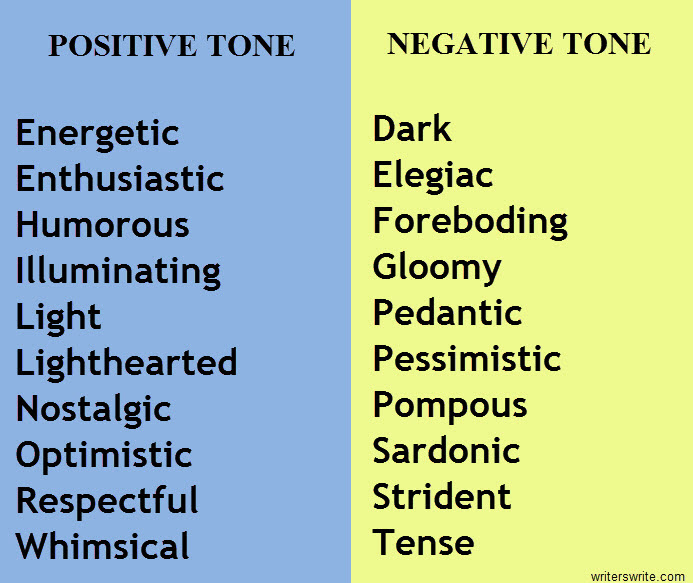The tone of a short story or novel is set by the author. As readers we can't hear the voice of the author when we are reading but we can surmise what type of story it is - how dark or light it is - by the words an author uses and the way the author uses them. Business professionals writing business articles are expected to use a confident tone or readers won't believe they know what they are talking about. Fiction writers need to a pick a tone that entertains, properly conveys the appropriate story type or genre and connects with the reader.
Author Mort Castle explains how a writer sets the tone in his article The Writer's Voice in the Reader's Mind. He also gives some examples showing how using the wrong tone completely fails to connect with the reader.
Alex Keegan shows you how tone can dramatically alter the style, mood and emotion of your writing in his article, "Theme Music: Tone is Not an Accident." He uses examples from literature and also describes the importance of getting the opening right and setting the tone from the start of your story.
Tone Words
A tone word is just an adjective used to describe an author's tone. Beginning writers may seek out these words but developing your own voice takes time and practice. When you find your voice you won't be able to describe it with just one adjective. Alice Hoffman told The Writer in an interview, "For me, magic is about the way the story is told rather than the story itself. It’s not a hocus-pocus influence in the plot. It’s more the tone of the story, the way the story tries to draw you in and create a fictional world. I’d like to add that I think the most important thing for beginning writers is to find their own voice."
As Your Dictionary explains examples of tone in a story can "include just about any adjective you can imagine." An author can come across as frightened, arrogant, weird, concerned, peaceful, frustrated, angry, esoteric, loving, serious, etc. The same adjectives that can be used to describe a speaker or a person you just met.Our "Tone Examples in Literature" article gives examples of how book critics -- and authors themselves - have described the tone of novels. As you will see critics often use more than one word to describe an author's tone.
Here are some examples and resources for positive and negative tones. It is usually easy to follow an author's tone but an author can be somewhat sarcastic while conveying a positive tone. The author's underlying tone will come across the more that reader reads the author's short story or paper.

Positive Tone Words
- Energetic
- Enthusiastic
- Humorous
- Illuminating
- Light
- Lighthearted
- Nostalgic
- Optimistic
- Respectful
Negative Tone Words
- Dark
- Elegiac
- Foreboding
- Gloomy
- Pedantic
- Pessimistic
- Pompous
- Sardonic
- Strident
- Tense
Negative tone words can sometimes be antonyms of the positive tone words.
Sources for finding more: You can find more by scouring big lists of adjectives like this list of adjectives that includes angelic, easy-going, happy-go-lucky, humble, sentimental, urban, unselfish, unpleasant, vibrant, woeful and many others.An author's tone can also be confessional, factual, informative or matter-of-fact in addition to having a negative or positive tone. Tones are far more complex than just a singular word. A novelist is more likely to be described by a reader as having a tone that is dark, light or upbeat, formal or informal, serious, intimate or personal than by a less common single adjective. If you read the book reviews in The New York Times you will often find descriptions of the author's tone. The complexity of tone is evident when authors attempt to translate works from one language to another.
You can often find the tone of a novel described in a review, book blurb or author interview. We have provided some tone examples for you. These examples alone show that tone is not usually described as just a single word.


